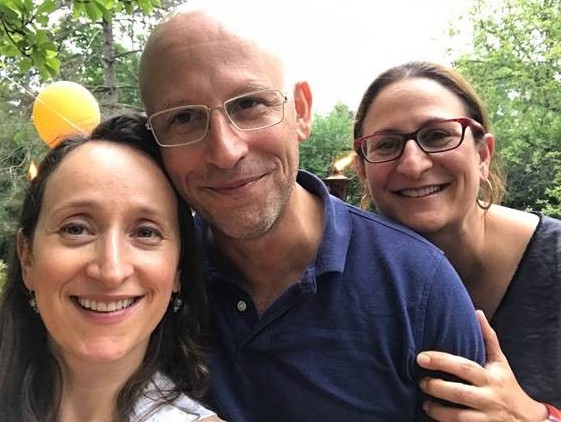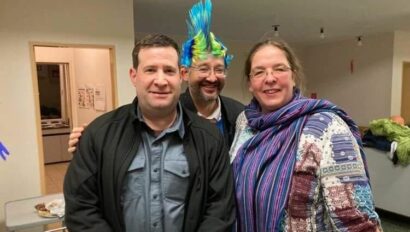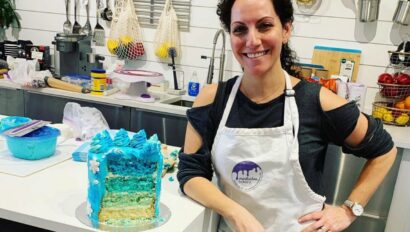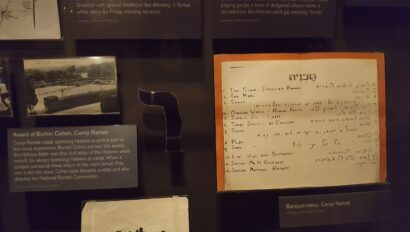When Tova Rothschild, an Israeli educator living in Milwaukee, took a summer teaching job at Ramah in 1984, she had no way of knowing how significantly the decision would impact her family.
That summer, her eldest, Tomer, became a camper in Solelim. His two younger sisters, Leelach and Leeatt were in Rishonim, at the time referred to as “staff brats.”
“As the middle child it was so nice to have my older brother there with me, and my cute younger sister,” Leelach said. “During the first summer at camp, when my mom was teaching and my father would come up to visit every Shabbat, the five of us sitting together at Kabbalat Shabbat was so special and memorable.”
Having lived in China off and on since 1995, and then full time in Beijing for the last 11 years, Tomer (Nivonim 1988) has made an effort to maintain relationships with his camp friends and eidah mates. “I go back twice a year to the states, and for several years now we have had a little reunion of people in my eidah, starting with just a few of my friends, and now the reunion keeps getting larger and snowballs every year,” Tomer said. “I stay in touch with at least a dozen friends from my eidah, in Atlanta, St. Louis, Chicago, Philadelphia, and cities all over.”
For the past ten years, Ramah has unexpectedly played a major role in influencing the way Tomer runs his business. Tomer and his wife Stacy co-founded Elite Scholars of China, a college counseling team coaching Chinese students and preparing them to apply to top-tier American universities.
Recently, they have expanded into a new area. “We run a summer camp,” Tomer said. This new innovation includes a three-week intensive summer trip, touring American universities and engaging in intensive college preparatory coursework. “Each summer I laugh to myself that I am a rosh eidah, but instead of peulat erev we have SAT classes, and instead of bunks we are in college dorms, but the intensity of programming and community building is much like Camp Ramah.”
Leelach (Nivonim 1991) credits her time as a doctor in the marp (infirmary) with reconnecting her and her family to Ramah. “It was so special to come back for the first time since I was a junior counselor, and being a doctor helped me see camp in a whole new way.”
As camp doctor, Leelach also reconnected with old friends from her first summer at Ramah. “Working in the marp, I overlapped with the first friend I made at camp, Rebecca Minkus, who I met hanging upside down at gymnastic bars when we were both 8 years old in Rishonim. We have a picture together from that summer.”
Leeatt (Nivonim 1995), the youngest sibling, also has fond memories of Ramah that she brings with her into her adult life. “To me, Ramah was about finding and creating community. Now professionally, my desire is to bring people together to learn about communities that are under-resourced and underserved, and seize opportunities to make a positive impact.” Leeatt does this through her specialty gifting company, Packed with Purpose, which curates quality and socially conscious gift bags. “Our company sources its products from social enterprises creating good across the country, whether that be coffee made by individuals with disabilities or glass-blown wine stoppers produced by youth victims of gun violence. There is a story of social impact behind each product.”
Leeatt felt that social consciousness underscored her experience at Ramah during formative years in her life. “Ramah has always provided opportunities for individuals of all different talents and abilities to be included and share in community. We spent a lot of time focused on our collective responsibility for one another, thinking about how to help others, and how to make sure camp was an accessible, open, wonderful, safe place for everyone. That is a piece of Ramah that I carry through with me.”
Tomer, Leelach, and Leeatt have all carried a piece of Ramah with them, and they are passing on the Ramah gene to their children. Though Tomer’s wife Stacy is from Phoenix and grew up attending Camp Ramah in California, their children now attend Ramah Wisconsin, having been campers this past summer in Garinim and Solelim. Leelach’s daughter Gavi also attends Ramah Wisconsin during the summer, now the most consistent time of year that the cousins share a time zone.
During the winter season, the Rothschild siblings have, coincidentally, incorporated their Ramah memories into the same part of their children’s daily routine – bedtime. “If you asked my children based on their bedtime stories what Jewish experience has been most central to their father’s identity, they would say that Camp Ramah was #1,” Tomer said. Leeatt shared that she sings the Himnon Ramah to put her 2- and 3-year-olds to bed at night.
Though their years as campers and staff members are now a memory, Tomer, Leelach, and Leeatt all shared that Ramah continues to make an appearance in their lives in unexpected ways. Tomer shared the following story about a recent example:
“We had a Shabbaton here in Beijing, and I met a man there from Kansas City (Ben Ross, Nivonim 1996). Within seconds we discovered that we both went to Ramah Wisconsin. Though he was at least 10 years younger than me, we knew so many overlapping people in common through camp. Meanwhile, others were slowly introducing themselves to one another, looking at us slack-jawed, in disbelief at how many mutual connections we had, and how we could go on talking for an hour, having only met moments before, at a Shabbaton near the Great Wall of China. That is part of the magic of Camp Ramah.”






